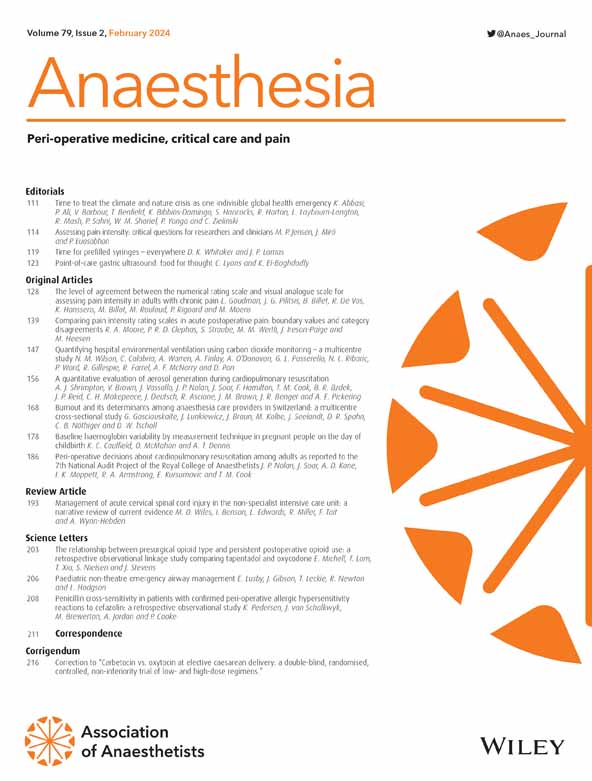Effect of peri‐operative pharmacological interventions on postoperative delirium in patients having cardiac surgery: a systematic review and Bayesian network meta‐analysis
IF 6.9
1区 医学
Q1 ANESTHESIOLOGY
引用次数: 0
Abstract
SummaryIntroductionPostoperative delirium is a common complication following cardiac surgery. Despite its known impact on patient outcomes, effective preventative strategies remain elusive. We aimed to perform a comprehensive Bayesian network meta‐analysis of randomised controlled trials assessing the effect of pharmacological interventions on the incidence of postoperative delirium.MethodsDatabases were searched from inception to September 2024. Our search was updated in January 2025. Eligible studies included randomised controlled trials reporting the incidence of postoperative delirium in patients having cardiac surgery treated with pharmacological interventions. Bayesian models were used to estimate risk ratios (RR) and mean differences with 95%CrI through Markov chain Monte Carlo. Interventions were ranked using the surface under the cumulative ranking curve. Sensitivity analyses and grading of recommendations, assessment, development and evaluation assessment were conducted to evaluate the robustness and certainty of evidence.ResultsSeventy‐nine randomised controlled trials comprising 24,827 patients were included, with 29 pharmacological interventions compared. Dexmedetomidine combined with melatonin was the most effective intervention, reducing the incidence of postoperative delirium compared with placebo (risk ratio 0.31, 95%CrI 0.13–0.69; low certainty). Dexmedetomidine with melatonin also significantly decreased intensive care unit stay (2.4 days, 95%CrI ‐3.50–1.10) and hospital stay (1.32 days, 95%CrI ‐2.09 to ‐0.57). Other interventions, including ketamine and risperidone, showed potential efficacy but with low or very low certainty of evidence.DiscussionWe identified dexmedetomidine with melatonin as the most effective pharmacological strategy for preventing postoperative delirium following cardiac surgery. Whilst these findings highlight potential benefits, the low certainty of evidence underscores the need for more high‐quality primary evidence.围术期药物干预对心脏手术患者术后谵妄的影响:一项系统综述和贝叶斯网络meta分析
前言术后谵妄是心脏手术后常见的并发症。尽管已知其对患者预后的影响,但有效的预防策略仍然难以捉摸。我们的目的是对随机对照试验进行全面的贝叶斯网络meta分析,以评估药物干预对术后谵妄发生率的影响。方法检索数据库自成立至2024年9月。我们的搜索在2025年1月更新。符合条件的研究包括报告接受药物干预的心脏手术患者术后谵妄发生率的随机对照试验。使用贝叶斯模型通过马尔可夫链蒙特卡罗估计风险比(RR)和95%CrI的平均差异。采用累积排序曲线下的曲面对干预措施进行排序。对建议、评价、发展和评价评价进行敏感性分析和分级,以评价证据的稳健性和确定性。结果纳入79项随机对照试验,包括24,827例患者,比较了29种药物干预措施。右美托咪定联合褪黑素是最有效的干预措施,与安慰剂相比,降低了术后谵妄的发生率(风险比0.31,95%CrI 0.13-0.69;低确定性)。右美托咪定联合褪黑素也显著降低重症监护病房住院时间(2.4天,95%CrI‐3.50-1.10)和住院时间(1.32天,95%CrI‐2.09 - 0.57)。其他干预措施,包括氯胺酮和利培酮,显示出潜在的疗效,但证据的确定性很低或很低。我们确定右美托咪定与褪黑素是预防心脏手术后谵妄最有效的药理学策略。虽然这些发现强调了潜在的益处,但证据的低确定性强调了需要更多高质量的主要证据。
本文章由计算机程序翻译,如有差异,请以英文原文为准。
求助全文
约1分钟内获得全文
求助全文
来源期刊

Anaesthesia
医学-麻醉学
CiteScore
21.20
自引率
9.30%
发文量
300
审稿时长
6 months
期刊介绍:
The official journal of the Association of Anaesthetists is Anaesthesia. It is a comprehensive international publication that covers a wide range of topics. The journal focuses on general and regional anaesthesia, as well as intensive care and pain therapy. It includes original articles that have undergone peer review, covering all aspects of these fields, including research on equipment.
 求助内容:
求助内容: 应助结果提醒方式:
应助结果提醒方式:


